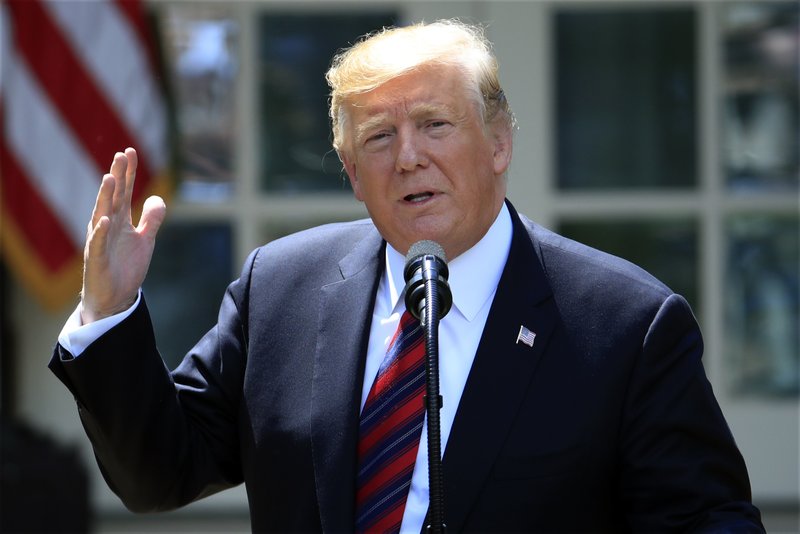WASHINGTON -- President Donald Trump's administration has told lawmakers that it probably will cost more to care for migrants crossing into the United States from Mexico than the $2.9 billion in emergency money requested just two weeks ago.
In a White House letter released Saturday, acting budget chief Russell Vought said "the situation has continued to deteriorate and is exceeding previous high-end estimates."
Health and Human Services Secretary Alex Azar said in a separate letter that needs for the unaccompanied children account "could grow further and be closer to the worst-case scenario [the department] had proposed be the basis for the supplemental request, which was $1.4 billion higher."
The warning about increasing expenditures comes as the administration and Congress struggle to push through an emergency disaster relief spending bill that could be the vehicle for more money for the border situation. Trump has resisted efforts to provide extra money for Puerto Rico, which is struggling to recover from twin hurricanes in 2017, arguing that it has already gotten enough.
On May 10, the House passed legislation providing $19.1 billion in relief for communities hit by various natural disasters and for farmers affected by the trade war, with 34 Republicans joining the Democratic majority. Trump came out against the measure, but Senate Republicans and Democrats have reported progress in recent days toward a compromise.
Senate Majority Leader Mitch McConnell, R-Ky., wants to get the measure completed by the end of this week.
In a document accompanying Vought's letter on Friday, the administration said the number of unaccompanied minors referred to the Department of Health and Human Services for care has increased by more than 57% over this time last year.
The government in recent days has begun flying hundreds of migrants from south Texas to holding cells in California. Border authorities detained 109,144 migrants at the southwest border in April, including at its legal ports of entry, the highest total since 2007.
The administration has already reallocated nearly $400 million to respond and "curtailed expenditures not essential to the health and safety" of the children.
The $2.9 billion was part of an overall package of $4.5 billion sought May 1 by the administration for border spending, including expenses for security personnel, additional detention beds, and operations combating human smuggling and trafficking.
PLAN CALLED OFF?
Separately, the Trump administration has halted plans to send thousands of people who entered the country illegally at the Mexican border to the Florida counties of Broward and Palm Beach, Palm Beach County Sheriff Ric Bradshaw announced Saturday.
"It appears that Border Patrol has backed off its initial plans to transport a thousand illegal immigrants to south Florida," Bradshaw announced in an audio clip posted to Twitter. "Because of everybody's efforts, we are able to stop what appeared to be a crisis for our community."
But other officials who had first raised awareness of the plans said they were surprised by the news and had heard nothing from the federal government.
"We'd like to get some confirmation from the federal government and we'd like to talk to somebody -- anybody -- that can tell us the good news," said Broward County Commissioner Mark Bogen. "This is very unusual that we cannot get a phone call from anybody in Border Patrol or Homeland Security or any other agency to tell us that we don't need to be concerned in two weeks."
Two weeks was the amount of time officials had initially been given until the first loads of migrants from the border would arrive in Palm Beach and Broward counties -- 500 to each county each month, with no deadline set for the influx to end.
The news -- which Broward and Palm Beach county officials learned from immigration officials in south Florida -- caught state government officials unaware, with Republican Gov. Ron DeSantis, a close ally of Trump, saying he strongly opposed the plan.
"This was not something that came down from the White House. This is something that came out of the agency," DeSantis said, referring to Border Patrol. "Sometimes this stuff happens. Ultimately this is something I'm going to have to talk to the president about."
But at a rally in Green Bay, Wis., on April 27, Trump told the crowd that sending migrants to so-called sanctuary cities was "actually my sick idea."
Neither the Broward nor Palm Beach county governments refuse to cooperate with immigration officials, except in obeying a 2014 court order that found holding inmates longer than their sentences to comply with immigration detainers would be a violation of civil rights.
By Friday night, a senior official with the U.S. Customs and Border Protection agency told the Sun Sentinel that the plan to send a 1,000 migrants a month to south Florida, without any federal aid to house them or help provide for them, was only part of a "contingency plan" being developed, and was only a possibility should that plan move forward.
"We do not have any aircraft flying into Florida at this time, but we are looking at capacity building," the official told the Sun Sentinel on Friday. "All we are looking at right now is where we have the capacity."
Now, according to Bradshaw, that contingency plan is apparently off the table.
Information for this article was contributed by Andrew Taylor of The Associated Press; by Peter Baker of The New York Times; and by Dan Sweeney, Anthony Man and Skyler Swisher of the Sun Sentinel.
A Section on 05/19/2019
